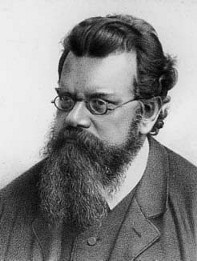Ludwig Boltzmann (1844-1906)
Ludwig Boltzmann was born in 1844 (Austria). Boltzmann was awarded a doctorate from the University of Vienna in 1866 for a thesis on the kinetic theory of gases supervised by Josef Stefan. After obtaining his doctorate, he became an assistant to his teacher Josef Stefan. Boltzmann taught at Graz, moved to Heidelberg and then to Berlin. In these places he studied under Bunsen, Kirchhoff and Helmholtz. In 1869 Boltzmann was appointed to a chair of theoretical physics at Graz. He held this post for four years then, in 1873, he accepted the chair of mathematics at Vienna. He did not stay very long in any place and after three years he was back in Graz, this time in the chair of experimental physics.

Boltzmann, at least half jokingly, used to say that the reason he moved around so much was that he was born during the dying hours of a Mardi Gras ball. It was only half joking since he did feel that his nature made him subject to rapid swings between happiness and sadness. His personality certainly had a major impact on the direction that his career took and personal relationships, where he was always very soft-hearted, played a big part. He suffered from an alternation of depressed moods with elevated, expansive or irritable moods. Indeed his physical appearance, being short and stout with curly hair, seemed to fit his personality. His fiancée called him her "sweet fat darling".
After another three years, in 1894, Boltzmann moved back to Vienna, this time to the chair of theoretical physics which became vacant on the death of his teacher Josef Stefan. However, the following year Ernst Mach was appointed to the chair of history and philosophy of science at Vienna. Boltzmann had many scientific opponents but, to Boltzmann, Mach was more than a scientific opponent as the two were on bad personal terms. In 1900, because of his dislike of working with Mach, Boltzmann moved to Leipzig but here he became a colleague of his strongest scientific opponent Wilhelm Ostwald. Despite their scientific differences Boltzmann and Ostwald were on good personal terms.
In 1901 Mach retired from Vienna due to ill health, and because of this Boltzmann's reason for moving from Vienna had gone. In 1902 he returned to Vienna to his chair of theoretical physics which had not been filled in the intervening period. In addition to his teaching in mathematical physics, Boltzmann was given Mach's philosophy course to teach. His philosophy lectures quickly became famous with the audience soon being too large for the biggest lecture hall available. In fact because of the fame of these lectures Boltzmann was invited to the Palace of Franz Josef.
Boltzmann's fame is based on his invention of statistical mechanics. This he did independently of Willard Gibbs. Their theories connected the properties and behaviour of atoms and molecules with the large scale properties and behaviour of the substances of which they were the building blocks. Boltzmann obtained the Maxwell-Boltzmann distribution in 1871, namely the average energy of motion of a molecule is the same for each direction. He was one of the first to recognise the importance of Maxwell's electromagnetic theory.
Boltzmann worked on statistical mechanics using probability to describe how the properties of atoms determine the properties of matter. In particular his work relates to the Second Law of Thermodynamics which he derived from the principles of mechanics in the 1890s. The equations of Newtonian mechanics are reversible in time and Poincaré proved that if a mechanical system is in a given state it will return infinitely often to a state arbitrarily close to the given one.
In 1904 Boltzmann visited the World's Fair in St Louis, USA. He lectured on applied mathematics and then went on to visit Berkeley and Stanford. Unfortunately he failed to realise that the new discoveries concerning radiation that he learnt about on this visit were about to prove his theories correct.
Attacks on his work continued and he began to feel that his life's work was about to collapse despite his defence of his theories. Depressed and in bad health, Boltzmann committed suicide just before experiment verified his work. On holiday with his wife and daughter at the Bay of Duino near Trieste, he hanged himself while his wife and daughter were swimming. However the cause of his suicide may have been wrongly attributed to the lack of acceptance of his ideas. We will never know the real cause which may have been the result of mental illness causing his depression.

Connect with us
Contact us today